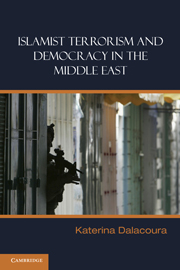Book contents
- Frontmatter
- Contents
- Acknowledgements
- Introduction: The Book's Central Question and Rationale
- 1 Terrorism, Democracy and Islamist Terrorism
- 2 Transnational Islamist Terrorism: Al Qaeda
- 3 Islamist Terrorism and National Liberation: Hamas and Hizbullah
- 4 Islamist Terrorism in Domestic Conflicts: The Armed Islamic Group in Algeria and the Gamaa Islamiya in Egypt
- 5 Moderation and Islamist Movements in Opposition: The Jordanian Muslim Brotherhood/Islamic Action Front, the Egyptian Muslim Brotherhood and the Tunisian Nahda
- 6 Islamist Moderation and the Experience of Government: Turkey's Welfare and Justice and Development Parties and the Islamic Republic of Iran
- Conclusion
- Bibliography
- Index
3 - Islamist Terrorism and National Liberation: Hamas and Hizbullah
Published online by Cambridge University Press: 05 June 2012
- Frontmatter
- Contents
- Acknowledgements
- Introduction: The Book's Central Question and Rationale
- 1 Terrorism, Democracy and Islamist Terrorism
- 2 Transnational Islamist Terrorism: Al Qaeda
- 3 Islamist Terrorism and National Liberation: Hamas and Hizbullah
- 4 Islamist Terrorism in Domestic Conflicts: The Armed Islamic Group in Algeria and the Gamaa Islamiya in Egypt
- 5 Moderation and Islamist Movements in Opposition: The Jordanian Muslim Brotherhood/Islamic Action Front, the Egyptian Muslim Brotherhood and the Tunisian Nahda
- 6 Islamist Moderation and the Experience of Government: Turkey's Welfare and Justice and Development Parties and the Islamic Republic of Iran
- Conclusion
- Bibliography
- Index
Summary
Associating Islamism and Islamist terrorism with national liberation, as I do in this chapter, is controversial. The rejection of nationalism and the nation-state and the positing of the umma – the community of believers – as the primary object of identity is one of the great unifying themes of Islamism. If one focuses solely on the anti-nationalist discourse of Islamist movements, describing any of them, including the two case studies in this chapter, Hamas (Harakat al Muqawama al Islamiyya, Islamic Resistance Movement) and Hizbullah (Party of God), as nationalist, will appear contradictory. However, I argue that Islamist movements are political entities and, as such, employ and interpret doctrines and beliefs in a flexible and inventive manner. Islamist ideology is not inherently and necessarily opposed to any set of ideas, including nationalism, but dynamically interacts with them.
Undoubtedly, Hamas's call to jihad has been cast in nationalist hues and ‘customised’ to the specific Palestinian milieu. The organisation has tried to overcome the apparent incompatibility between Islamism and the nation-state by arguing that the territory of Palestine is holy; for instance, Article 11 of the Hamas Charter states that: ‘The Islamic Resistance Movement believes that the land of Palestine is an Islamic land entrusted to the Muslim generations until Judgement Day. No one may renounce all or even part of it.’ Article 12 further asserts: ‘Nationalism from the point of view of the Islamic Resistance Movement is part and parcel of religious ideology.’
- Type
- Chapter
- Information
- Islamist Terrorism and Democracy in the Middle East , pp. 66 - 96Publisher: Cambridge University PressPrint publication year: 2011



